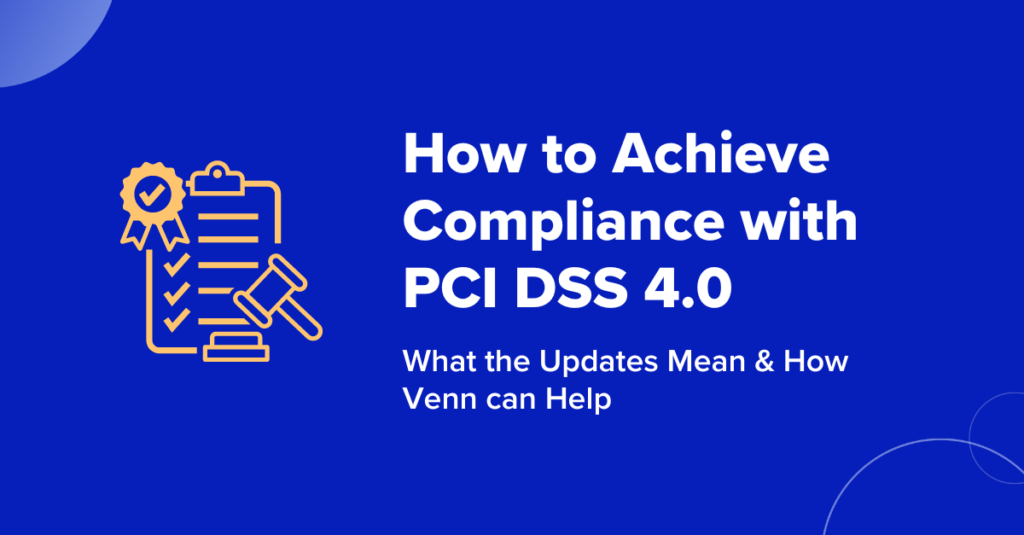PCI DSS 4.0: Securing Remote Work on Personal Devices

PCI DSS 4.0 (Payment Card Industry Data Security Standard version 4.0) introduced several updates and new requirements to improve payment security and adapt to emerging security threats. In this blog, we’ll provide an overview of the key changes and how they apply to remote work on personal or unmanaged laptops, as well as how Venn can help organizations that need to meet these requirements.
Key Changes in PCI DSS 4.0:
Some of the key changes include:
- Enhanced Security Controls: Introduces more rigorous and specific security controls to better protect cardholder data.
- Increased Flexibility: Provides organizations with more options to meet security objectives, allowing for different methods to achieve compliance.
- Risk-Based Approach: Emphasizes a risk-based approach to security, encouraging organizations to tailor their controls based on their specific environment and risk profile.
- Authentication Requirements: Strengthens authentication requirements, including multi-factor authentication (MFA) for all access to the cardholder data environment.
- Monitoring and Testing: Enhances monitoring and testing procedures to ensure continuous compliance and effectiveness of security controls.
- Encryption and Key Management: Updates requirements for encryption and key management to protect cardholder data both at rest and in transit.
Application to Remote Work on Personal or Unmanaged Laptops:
There are key areas where this applies:
- Multi-Factor Authentication (MFA):
- All remote access to the cardholder data environment must require MFA. Personal laptops used by remote workers must have MFA implemented to access any system that stores or processes cardholder data. [PCI-DSS Requirements 8.4 & 8.5]
- Data Encryption:
- Cardholder data accessed or processed on personal laptops must be encrypted both in transit and at rest. This ensures that sensitive information is protected, even if the personal device is compromised. [PCI-DSS Requirement 3]
- Endpoint Security:
- Personal laptops must have robust endpoint security measures in place, such as anti-malware solutions, firewalls, and regular security updates. These measures help protect against malware and other cyber threats. [PCI-DSS Requirements 5.2, 5.3 & 6.3]
- Access Controls:
- Access controls should be strictly enforced to ensure only authorized personnel can access sensitive data. [PCI-DSS Requirements 7, 8 & 10]
- Secure Networking:
- Remote workers must use secure methods to access corporate networks, such as VPNs (Virtual Private Networks) or other secure tunneling protocols. [PCI-DSS Requirement 4]
- Logging and Monitoring:
- Activities on personal laptops that access the cardholder data environment must be logged and monitored. This includes tracking access attempts, successful logins, and any actions taken within systems that handle cardholder data. [PCI-DSS Requirement 10]
- Policy and Training:
- Organizations must develop and enforce policies specific to remote work and personal device usage. Employees should be trained on these policies, including best practices for securing their devices and recognizing potential security threats. [PCI-DSS Requirements 12.1, 12.2 & 12.6]
- Incident Response Plan:
- An incident response plan must be in place to address any potential data breaches or security incidents involving personal laptops. This includes procedures for remote wipe capabilities to remove sensitive data from compromised devices. [PCI-DSS Requirement 12.10]
PCI DSS 4.0 aims to enhance the security of cardholder data by implementing more rigorous controls, particularly for remote work scenarios. Personal laptops used for remote work must adhere to strict security measures such as MFA, data encryption, endpoint security, access controls, regular monitoring, comprehensive policies, and incident response plans. By following these guidelines, organizations can ensure compliance with PCI DSS 4.0 and protect sensitive payment data from potential breaches.
Enhanced Security Controls with Venn’s Blue Border™
Venn’s Blue Border™ is the first purpose-built software for securely enabling BYOD workforces. Similar to an MDM solution but for laptops – work lives in a company-controlled Secure Enclave installed on the user’s PC or Mac, where business activity is isolated and protected from any personal use on the same computer. Work applications run locally within the Enclave – visually indicated by a blue border – securing company data while guaranteeing end-user privacy.
Venn’s Blue Border technology can significantly aid in complying with PCI DSS 4.0 by providing a secure, isolated environment for accessing cardholder data on personal or unmanaged devices. Here’s how Blue Border addresses specific requirements of PCI DSS 4.0:
Enhanced Security Controls
Secure Environment: Venn’s Blue Border creates a dedicated, isolated and encrypted workspace on the user’s device. This ensures that cardholder data is accessed within a controlled, secured and monitored environment, reducing the risks of unauthorized access and data leakage.
Increased Flexibility
Adaptability: Blue Border can be configured to meet various compliance needs and can integrate with existing security policies and procedures. This flexibility allows organizations to tailor the Secure Enclave’s security controls to their specific environment and risk profile.
Risk-Based Approach
Risk Mitigation: By isolating sensitive activities within Blue Border, Venn helps organizations adopt a risk-based approach to security. This dedicated encrypted workspace reduces the attack surface and minimizes the risk of data leakage onto personal devices.
Authentication Requirements
Multi-Factor Authentication (MFA): Venn’s Blue Border supports MFA, ensuring that only authorized users can access the Secure Enclave, and consequently, the cardholder data environment. This is crucial for complying with the strengthened authentication requirements of PCI DSS 4.0.
Monitoring
Continuous Monitoring: Venn’s platform includes robust logging and monitoring capabilities, allowing organizations to continuously track access and activity within Blue Border. This helps in meeting the enhanced monitoring and logging requirements of PCI DSS 4.0.
Encryption
Data Encryption: Venn ensures that data within Blue Border is encrypted both at rest and in transit. This protects cardholder data from unauthorized access and is in line with the updated encryption and key management requirements of PCI DSS 4.0.
In the event of a stolen device, Venn’s encryption prevents work data from being accessed.
Endpoint Security
Enhanced Endpoint Security: By confining sensitive operations to Blue Border, Venn enhances endpoint security. The rest of the user’s device remains segregated from the enclave, reducing the risk of data leakage onto personal devices.
To ensure device compliance, Venn does an analysis upon every login to check the status of things like anti-malware, network configurations and performance.
Secure Access Controls
Secure Connectivity: Blue Border can be accessed through secure methods, such as VPNs or encrypted tunnels, ensuring that remote workers connect securely to corporate networks and comply with access control requirements.
Regular Logging and Monitoring
Activity Logging: All activities within Venn’s Blue Border are logged and can be monitored in real-time. This comprehensive logging ensures that organizations can audit and review access and actions taken within Blue Border.
Policy and Training
User Training: Venn supports the enforcement of organizational security policies by providing a segregated and controlled environment for remote work. Training employees to use Blue Border helps reinforce best practices and compliance requirements.
Incident Response Plan
Remote Wipe Capability: Venn’s Blue Border includes remote wipe capabilities, allowing organizations to remove sensitive data from a user’s device if it is lost, stolen, or otherwise compromised. This is a critical feature for incident response and compliance with PCI DSS 4.0.
Summary
Venn’s Blue Border helps organizations comply with PCI DSS 4.0 by providing a secure, segregated, and encrypted environment for accessing cardholder data, ensuring that robust authentication, continuous monitoring, encryption, and secure access controls are in place. Venn’s technology helps mitigate risks associated with remote work on personal or unmanaged devices, supporting the enhanced security measures required by PCI DSS 4.0.
If you want to learn more about how Venn can help you meet PCI DSS 4.0 with your users’ personal or unmanaged devices, feel free to book some time and we can connect you with an expert.

Scott Lavery
SVP Marketing
More Blogs


